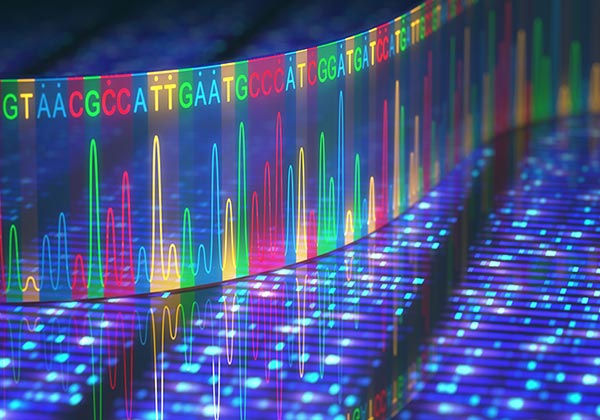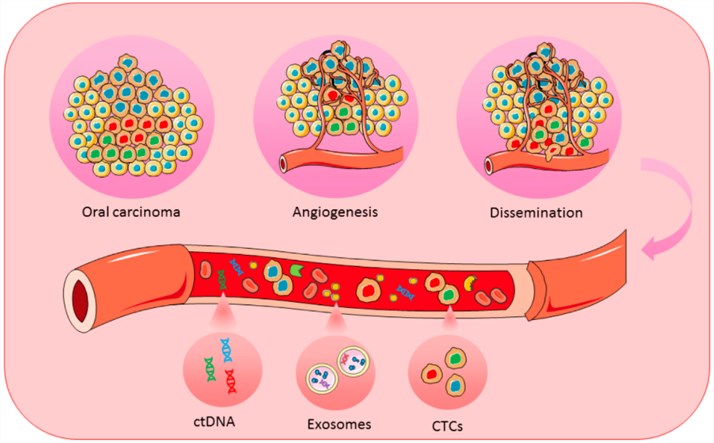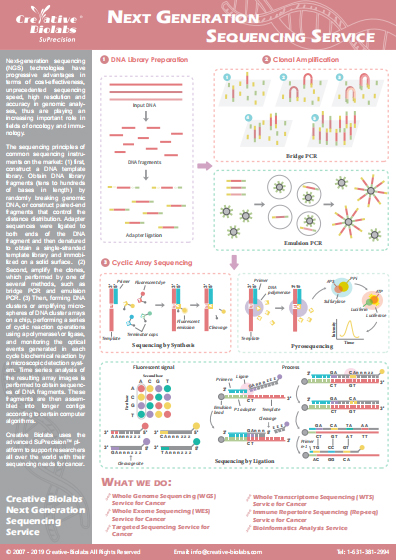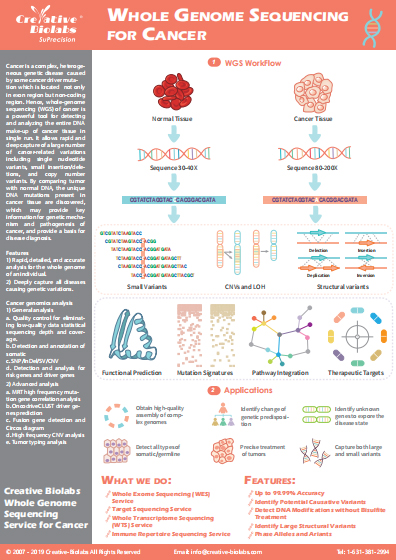
ctDNA Sequencing Services
ctDNA testing, also known as liquid biopsy, is a less-invasive diagnostic alternative to tissue biopsies and is expected to be applied in tumor diagnosis and prognosis. NGS provides an excellent technology that allows the detection of low levels of ctDNA in the blood in a highly sensitive and specific manner. Creative Biolabs is a world-leading service provider that is committed to offering a full range of NGS-based DNA/RNA sequencing services including ctDNA sequencing for tumor research.
Introduction of ctDNA
ctDNAs, also known as circulating tumor DNA, are a type of cell-free (cf) DNA fragments with a length of between 180-200 base pairs (bp). They are released by the tumor cells into the circulatory system. ctDNAs are considered promising tumor biomarkers because they carry important mutation information of original tumor cells or tissues. They have been widely used for tumor diagnosis and prognosis. Here introduce several applications of ctDNA detection in tumor research.
- Tumor Diagnosis. ctDNA testing is performed to detect multiple genetic mutations associated with tumor development. Finding these genetic mutations is helpful in tumor detection and diagnosis.
- Treatment Monitoring. An increased concentration of ctDNA or an increased number of mutations is associated with treatment failure. Detecting the number of ctDNA helps in indicating responses to treatment, facilitating doctors to select the most effective treatment.
- Prognosis. ctDNA has shown promise as a biomarker for tumor dynamics and recurrence after tumor resection surgery. A prospective study of 230 patients with early-stage colorectal cancer reported that 100% of patients who had detectable ctDNA at the first follow-up visit after tumor resection surgery relapsed while 10% of ctDNA-negative patients.
- Tumor Size/Disease Burden: Higher levels of ctDNA have been associated with greater disease burden and number of metastatic sites. Hence, ctDNA testing can be used to estimate tumor size or disease burden.
 Fig. 1 Schematic representation of CTCs, ctDNA, and exosomes for achieving personalized medicine in oral cancer. (Lousada-Fernandez, 2018)
Fig. 1 Schematic representation of CTCs, ctDNA, and exosomes for achieving personalized medicine in oral cancer. (Lousada-Fernandez, 2018)
NGS-based ctDNA Detection
NGS serves as a powerful platform for detecting low levels of ctDNA in the blood. NGS is not only used for the targeted panel for specific and highly sensitive detection of targeted ctDNA mutations but also the untargeted panel for the discovery of novel tumor-derived ctDNA alterations. In a study, scientists used a targeted gene panel consisting of the 13 most frequently mutated genes in breast tumors to detect and analyze the ctDNA from breast cancer patients. The results showed that ctDNA was significantly related to biologically invasive phenotypes, including large tumor size, negative ER, negative PR, positive lymph node, high histological grade, and positive HER2, which suggests NGS seems to be a sensitive method to detect ctDNA in early breast cancer patients at diagnosis.
Our Capacities
Our professional scientists have accumulated rich experience in ctDNA sequencing and analysis. We offer high-quality and low-cost, one-stop ctDNA sequencing services including ctDNA extraction, library preparation, Illumina sequencing, and bioinformatic analysis. We not only detect the known tumor-derived alterations in ctDNA by designing a series of targeted gene panels but identify rare unknown tumor-derived alterations in ctDNA by improving sequencing depth. In addition, we also support high-quality ctDNA methylation sequencing and analysis services. We are committed to becoming your reliable partner to advance tumor research involving early diagnosis, prognosis prediction, and treatment.
Advantages
- One-stop services from sample preparation to high-quality data delivery
- Specific enrichment of ctDNA fragments using our proprietary DNA extraction kit
- Strict quality control to ensure accurate data delivery
- Professional and personalized bioinformatic analysis to meet the purposes of different projects
If you are interested in our ctDNA sequencing services, please feel free to contact us for more details.
Reference
- Lousada-Fernandez, Fatima, et al. "Liquid biopsy in oral cancer." International journal of molecular sciences 19.6 (2018): 1704. Distributed under open access license CC BY 4.0, without modification.
Q&As
Resources
Infographics
Podcast
- Whole Genome Sequencing (WGS)
- Whole Exome Sequencing (WES)
- Targeted Sequencing
- Whole Transcriptome Sequencing (WTS)
- Immune Repertoire Sequencing (Rep-Seq)
- Epigenomics
- 3D Genomics
- Metagenomic Sequencing
- Single Cell Sequencing
- Spatial Transcriptome Sequencing




